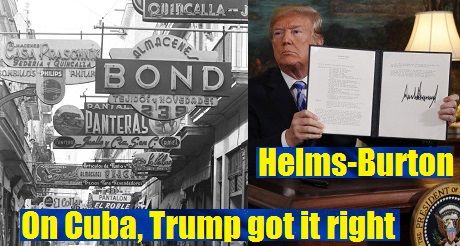On Cuba, Trump got it right. President Trump has broken rank with history and signaled that a full implementation of the controversial Title III will be the new practice
The Megarian Decree of 432 B.C. is believed to the first relevant policy of economic sanctions levied against a regime. In this case, the Athenian Empire’s executed formula against Sparta’s ally, Megara, was more in line with an embargo, which broadens the penalties and effectively seeks to limit and undermine the targeted enemy’s commercial activity.
Twenty-three years ago, the Cuban Liberty and Democratic Solidarity (Libertad) Act of 1996, better known as the Helms-Burton Act, was signed into law. Beginning May 2, Secretary of State Mike Pompeo announced that the Trump administration will comprehensively implement the most salient section of the legislation.
This will be a first time ever, and it couldn't come at a more welcome moment. To fully appreciate the Helms-Burton Act, one must keep in mind it’s underlying rationale. Cuban communism represented the largest theft (non-compensated mass nationalization) in history of U. S. citizens' commercial possessions. This convinced President John F. Kennedy that an embargo would be the least the United States could do in response. Additionally, as communist Cuba became a pivotal player in the promotion of Marxist subversion in the Western Hemisphere, regime change became an unstated goal, albeit of a secondary consideration but equally of moral importance.
Today, this policy of commercial and economic restraint constitutes the longest-running trade embargo in contemporary history. Its weakness has been not in its moral justification, but in the inconsistent and often contradictory manner which varying American presidencies have sought to apply it. In 1995, Sen. Jesse Helms. R-N.C., and Rep. Dan Burton, R-Ind., sought to fix this with legislation setting forth coherent trade and economic sanctions policy against the Castro government that could not be diluted by presidential whims. Noting the success that economic sanctions had in producing regime change in racist-era South Africa, it was no coincidence that the Helms-Burton law contained aspects which mimicked the intention of the Comprehensive Anti-Apartheid Act of 1986.
But the Helms-Burton bill, ultimately signed into law by President Bill Clinton, contained an unfortunate clause leaving the president in control of whether to waive its most powerful provision, Title III. In practice, this has rendered the Helms-Burton Act impotent, as every single American president has waived it. Until now.
President Trump has broken rank with history and signaled that a full implementation of the controversial Title III will be the new practice. The splendor of this section of the Helms-Burton Act is that it holds accountable businesses entities that have chosen to traffic in stolen American property. It allows for the affected parties to seek recourse against those entities in American courts. Of the 8,821 claims against this communist heist, 5,913 have been certified by the United States Foreign Claims Settlement Commission. The current value, as estimated by the commission, is about $9 billion.
President Trump should be commended for the courage he showed in breaking with the unfortunate tradition of stifling Helms-Burton's liberating capacity. Given Cuba’s imperialist role in the affairs of Venezuela and Nicaragua, and given the dangerous presence of Russia, China and Iran in the region, this measure is very much in America’s interest and a matter of national security.
Julio M. Shiling is a political scientist, writer and director of Patria de Martí. Published in the Washington Examiner ►
Ley Helms-Burton: Aplicación total
Ley Helms-Burton: ¿Quién aseguró su aprobación e implementación?
Ponencia Ley Helms-Burton y su implementación completa: ¿Ahora qué?

